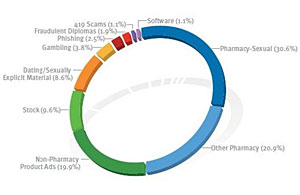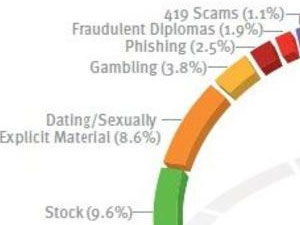 Nigerian 419 scammers fall far behind blue pill shifters for the trouser-dept failed.
Nigerian 419 scammers fall far behind blue pill shifters for the trouser-dept failed.
When it comes to spam, the most popular topic is pharmaceutical, with 30.6 per cent of spams trying to flog you sexual drugs with 20.9 per cent imploring you to invest in some other medicines.
The figures come from Microsoft’s latest Security Intelligence Report, which found that over half of all spam is pharmaceutical related, with offers for drugs like Viagra hoping to tempt the erection-challenged.
Although they’ve become notable for the ever increasing rewards on offer (“let me transfer $320 million into your account and you can take 25%), the infamous 419 scams make up just 1.1 per cent of the total, with phishing scams taking up 2.5% of all spam and fake diplomas 1.9%.

Microsoft believes that the latest figures show something of a score draw between spammers and email services trying to block them:
“Overall, the amount of spam that successfully evades the blocking and filtering techniques used by services like Windows Live Hotmail and EHS to land in users’ inboxes has decreased dramatically from its peak a few years ago, though the trend has been much flatter over the last year or two, indicating a state of rough equilibrium between spammers and e-mail services.
“This should not be taken as a sign that the pace of advancement and adaptation has slowed on either side, but rather that both spammers and spam fighters continue to adapt to new techniques deployed by their opponents, creating a complicated sort of stalemate in which neither side has managed to gain the upper hand.”
Perhaps keen to fit in a cheap Carry On joke into the proceedings, Microsoft have produce a ‘ring of spam’ showing how the spam is distributed.
Comments
One response to “Over Half Of All Spam For Pills And Viagra”
pharmaceutical related spam has become a big problem, as it reduces the trust between legal online pharmacys selling genuine products, & the internet user who receives all this spam.